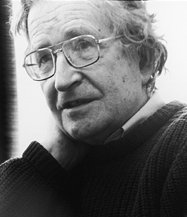Noam Chomsky has an interesting view on this, so I added it to the article. I added
"Noam Chomsky writes that he believes the Domino theory is roughly accurate. If a people in a poor county see another poor country take control of its economy and succeed, they will of course want to emulate them. This is why, he claims, the US put so much effort into suppressing people's movements in Chile, Vietnam, Nicaragua, Laos, Grenada, El Salvador, Guatemala, etc. "The weaker and poorer a country is, the more dangerous it is as an example. If a tiny, poor country like Grenada can succeed in bringing about a better life for its people, some other place that has more resources will ask, 'why not us?'" Chomsky refers to this as the "threat of a good example."
If one is a good Wikipedian, one find citations for one's claims, so I searched the Internet for the article where Chomsky says this. I found an excerpt on the New Humanist website, where they quote the Third World Traveler website quoting Noam Chomsky's book What Uncle Sam Really Wants. Chomsky likes to repeat himself, so one can find a citation of something you think you heard him say fairly easily.
Also, I put this paragraph in the section "Arguments in favor of the domino theory." This is slightly unusual, as most people who opposed the Vietnam War didn't think the domino theory was real, while Chomsky opposed the Vietnam War and thinks the domino theory is real, but for different reasons.
I check back a day later, and somebody has edited the paragraph. A user had put scare quotes around the phrase "people's movements" and appended "although he put a more positive spin on the threat" to the first sentence. That's kind of odd, but I didn't change it because "people's movements" isn't the perfect word to describe all the things Uncle Sam opposes. When one edits Wikipedia, one is supposed to describe one's edit. This user described his edit as "If what this anonymous IP says is true, then Chomsky's view is that of a blessing rather than the threat of tyranny." A little weird. I go to his Userpage, where Wikipedia users can describe themselves, and he goes out of his way to mention, among other things "This user is as anti-racist as he is anti-communist" and "This user rejects the myth that insurgents in Iraq are 'resisting U.S. occupation,' and knows that each terrorist group is fighting for their own agenda, making the Iraqi people the victims."* (He loves those scare quotes, doesn't he?)
It seems to me that his edits didn't help, but I left them because getting into "edit wars" is silly and multiple viewpoints are part of the point of a collaborative encyclopedia. Five hours later, he strikes again, this time adding "so-called" before his already scare-quoted "people's movements," his description of the edit reading "re-emphasizing Chomsky's false notions of the communist threat as 'people's movements.'" What strong feelings he must have on the matter. I still decide to let the edit stand, although I fear if I do that, he will spread his propanganda to the article "Vietnam War," and then to the article "Communist Party of Nepal," and from there to the article "Auto-Lite Strike," then to "2000 Cochabamba protests," and so on. No history will be safe from the red pen of this menace. So you could have a beginning of a disintegration that would have the most profound influences.
Well, maybe not. It is worth mentioning that another user added something to the paragraph, saying "Chomsky claims there are two domino effects, one internally discussed between US policy makers, which is that of the 'Good Example', and another for public consumption, that of the spread of 'Communism.'" He didn't cite this, so I'm not sure if that's a fair statement, but I let it stand.
*I think his comments on the Iraq War are part right: each group is fighting for their own agenda, making the Iraqi people the victims, but I find it odd that he excludes the US from this admonishment. Probably the same reason he thinks the Communists that the Vietnamese people supported** were an outside threat imposing tyranny.
**Even Eisenhower said if the 1955 elections had happened, in line with the Geneva Accords, Hồ Chí Minh would have 80% of the vote. Instead, South Vietnam claimed they weren't bound by the accords, and had a sham election to put Ngô Đình Diệm in charge. (For instance, Diệm*** got more votes than there were voters in some areas.) But I digress.
***Note on Vietnamese naming conventions: While their last name is listed first, they are still referred to formally by their given name (that is, the name that comes last.) In the case of Ngô Đình Diệm, "Ngô" is his family name, but he is referred to as "Prime Minister Diệm." This probably helps avoid confusion, as the top five family names are used by 71% of the country.


No comments:
Post a Comment